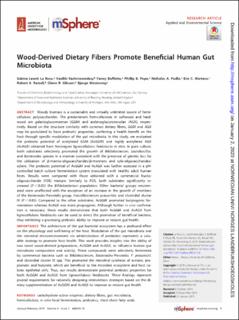Wood-derived Dietary Fibers Promote Beneficial Human Gut Microbiota
Leanti La Rosa, Sabina; Kachrimanidou, Vasiliki; Buffetto, Fanny; Pope, Phillip; Pudlo, Nicholas; Martens, Eric C.; Rastall, Robert; Gibson, Glenn; Westereng, Bjørge
Peer reviewed, Journal article
Published version

View/
Date
2019Metadata
Show full item recordCollections
Abstract
Woody biomass is a sustainable and virtually unlimited source of hemicellulosic polysaccharides. The predominant hemicelluloses in softwood and hardwood are galactoglucomannan (GGM) and arabinoglucuronoxylan (AGX), respectively. Based on the structure similarity with common dietary fibers, GGM and AGX may be postulated to have prebiotic properties, conferring a health benefit on the host through specific modulation of the gut microbiota. In this study, we evaluated the prebiotic potential of acetylated GGM (AcGGM) and highly acetylated AGX (AcAGX) obtained from Norwegian lignocellulosic feedstocks in vitro. In pure culture, both substrates selectively promoted the growth of Bifidobacterium, Lactobacillus, and Bacteroides species in a manner consistent with the presence of genetic loci for the utilization of -manno-oligosaccharides/ -mannans and xylo-oligosaccharides/ xylans. The prebiotic potential of AcGGM and AcAGX was further assessed in a pHcontrolled batch culture fermentation system inoculated with healthy adult human feces. Results were compared with those obtained with a commercial fructooligosaccharide (FOS) mixture. Similarly to FOS, both substrates significantly increased (P 0.05) the Bifidobacterium population. Other bacterial groups enumerated were unaffected with the exception of an increase in the growth of members of the Bacteroides-Prevotella group, Faecalibacterium prausnitzii, and clostridial cluster IX (P 0.05). Compared to the other substrates, AcGGM promoted butyrogenic fermentation whereas AcAGX was more propiogenic. Although further in vivo confirmation is necessary, these results demonstrate that both AcGGM and AcAGX from lignocellulosic feedstocks can be used to direct the promotion of beneficial bacteria, thus exhibiting a promising prebiotic ability to improve or restore gut health.
